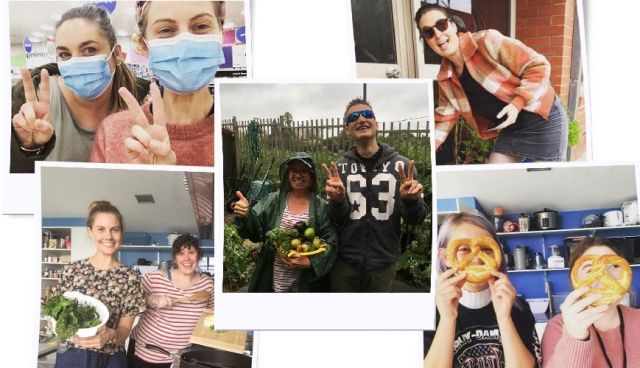Youth refuges staying positive as lockdown hits hard
13 August 2020

Melbourne’s second COVID-19 lockdown is taking a mental and physical toll on everyone, but it has become an especially tough time for vulnerable young people in the city.
The situation is now bigger than face masks and social distancing for these young people – it’s beginning to threaten their future housing and employment opportunities.
“Having been through the first lockdown, we have the benefit of knowing the challenges and the additional supports young people require,” says Claire Edmanson, who manages The Salvation Army’s two youth refuges in the city – Tranmere Street in Fitzroy and Upton Road in St Kilda.
“But the difference this time around is that, emotionally, it’s having a bigger impact on the young people accessing our service, which mirrors the experience of the general population. This second lockdown has placed further barriers between young people and their goals of securing employment and long-term housing, which creates a lot of additional stress.”
The two centres are supporting 22 young people on-site and up to 70 off-site. Claire and her team have kept the young peoples’ welfare a priority during this challenging time, especially with many of them being forced to stay inside for longer periods.
“The first time there was not a lot of issues with young people engaging [under COVID-19 restrictions]. But people are less engaged six months in, which is reflective of the wider community,” says Claire. “There are more conversations than last time about the impacts of COVID-19 and the second lockdown on mental health. In terms of people struggling with isolation, [we find] people living off-site in community are equally as isolated in houses or share houses. They are having the same experience we’re all having – it feels like, ‘When is it going to end?’”
Prior to COVID-19, Claire and her team relied heavily on face-to-face contact, enabling the young people to attend school, look for employment and find permanent housing. But, like all of us, they have learned to be adaptable in lockdown.
Homework club now takes place over Zoom instead of the communal table, a weekly cooking class is showing the young people how to use the fresh produce left at their doors, and ‘check-ins’ take place over the phone or by Zoom. The addition of therapy rabbit ‘Kim’, and therapy dogs, also help lift the young peoples’ moods. These activities are designed to help not only prepare them for the future but to cope with the uncertainty of the present.
“We are making sure that young people have a smartphone so they have video capacity, and access to the internet by purchasing data. And we are looking at what can we do on-site – providing resources for their rooms – activities, mindfulness exercises and DVD players,” says Claire. “One of the biggest challenges in lockdown for young people is education and managing schooling for home, so our Zoom homework club is where young people can bring homework and resumes.”
Deemed an essential service, these youth refuges have remained open 24/7, but social-distancing restrictions mean only a third of the rotating staff can serve at a time. Thankfully, their commitment has made the transition easier. And whether they are purchasing items to help clients beat boredom, transporting people to appointments or school [between lockdowns], or reminding residents to wear a mask, they have stayed compassionate and vigilant.
“I’ve been really proud to see the response of our staff,” said Claire. “There is, of course, a constant risk of COVID-19 within residential services, but we’ve had nothing but positive feedback and commitment from staff. We just have really tried to make sure, whenever possible, that young people remain the focus of the work we do.”
The teams at Tranmere Street and Upton Road continue to take life one day at a time. The future is full of uncertainty for the youth they connect with, but they are committed to supporting them for the long haul. So when COVID-19 restrictions lift, each of them will have the hope and future they deserve.
“At the moment we are in six weeks of lockdown, and we’re not planning beyond that,” said Claire. “We’ve got to just focus on what the current circumstances are and what we can do within them. Every young person is different.”
This article first appeared in The Salvation Army’s online magazine Others.org.au